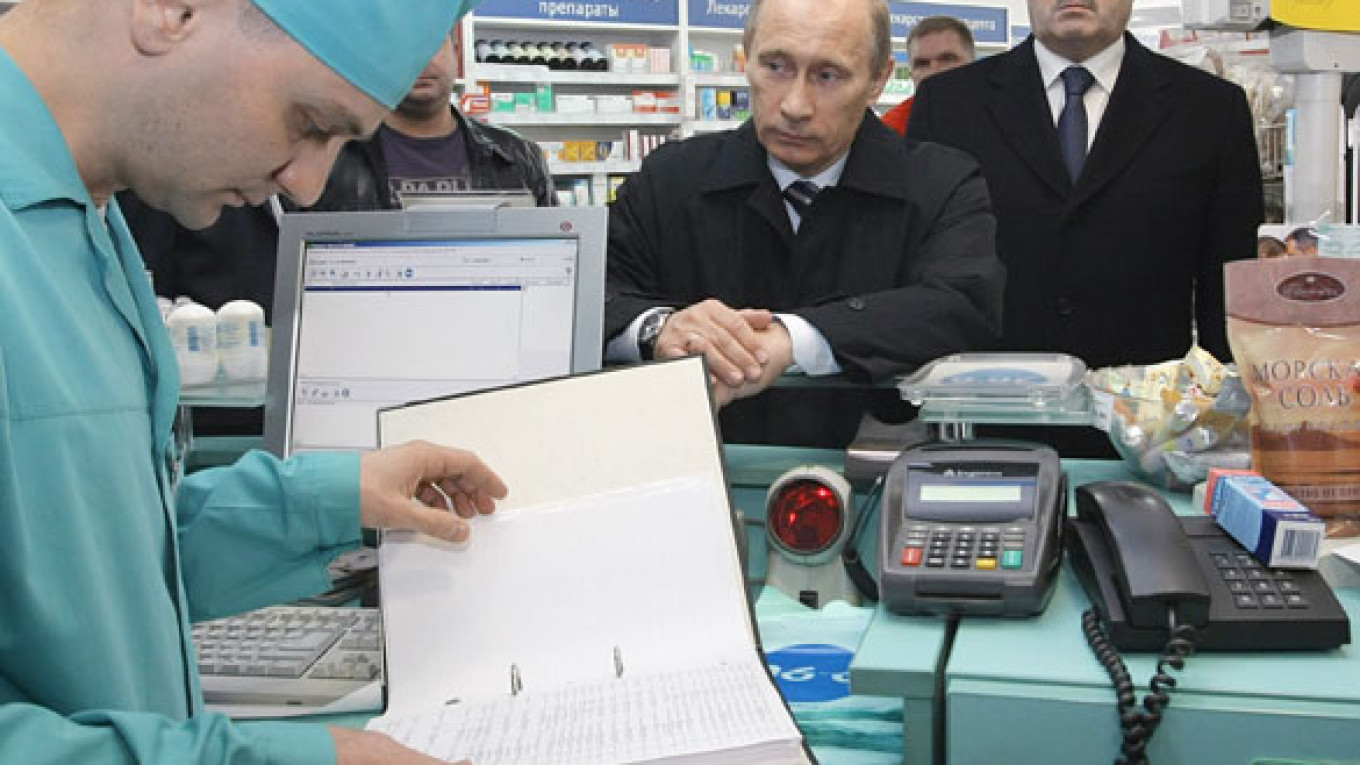Pharmacists in Murmansk received an unexpected visitor on Saturday when Prime Minister Vladimir Putin, who was in the northern port city to discuss the fish industry, ordered his driver to stop so he could check on medicine prices.
"Are there any complaints fr om customers? Are you complying with [pricing] requirements on vital drugs?" he asked a pharmacist at a store owned by the 36.6 chain. Putin then asked for the price of Arbidol, a Russian-made medicine to treat the flu, which was included on the government's list of vital drugs.
As the store employees frantically began flipping through the pages of a catalog, Putin informed them, "We're not in a hurry." He and officials traveling with him had just visited a local fish factory and were on their way to a government meeting to discuss the industry.
The appearance was not the first time that Putin had decided — apparently on a whim — to drop by a retailer to chat with customers and check on prices.
In June, Putin and a crowd of Cabinet members made an unannounced visit to a Perekryostok supermarket in Moscow, wh ere the prime minister inspected meat prices and persuaded the chain's chief executive to lower pork prices.
Managers at the 36.6 outlet were luckier, earning Putin's praise after he discovered that Arbidol was selling for 212 rubles ($7.30), well below the maximum price of 267 rubles.
"The repricing was done on time. The main thing is for our suppliers not to let us down," one employee told him, according to comments on the government web site.
People in line assured the prime minister that some municipal drugstores offered even lower prices. "If there are prices cheaper than this — that's great," Putin said.
Earlier this month, the government began enforcing markup limits on a list of drugs that comprise about one-third of the Russian pharmaceutical market.
Under the law, the federal government set limits for each region on wholesale and retail markups on imported drugs, which are added to the declared price at customs. For Russian-made drugs, the markup is calculated from the production price.
Putin has made the war on high drug prices a prominent line of rhetoric, warning governors earlier this month that they would be held responsible if prices keep rising.
He also said drugstores could have their licenses revoked for violations.
Murmansk Governor Dmitry Dmitriyenko, who accompanied Putin on the price-check, was spared a potentially embarrassing dressing-down, however.
"Your chain is not bad," Putin told the 36.6 pharmacists. "It's good that you are living up to the expectations of the government and the customers," he said.
The pharmacy chain 36.6, which is traded on the MICEX stock exchange, also owns drug maker Veropharm, which produces branded and generic pharmaceuticals.
Putin on Saturday ordered Andrei Krainy, head of the Federal Fisheries Agency, to make fishermen switch to the Russian-made Glonass satellite navigation system, even though it is not yet functioning properly.
"[We use the system that] was developed earlier," Krainy said, explaining why Glonass devices were not on Russian fishing vessels.
"And Glonass still has blank spots, we don't see the ships for several hours. … As soon as Glonass starts working, we'll switch to Glonass," he told Putin, according to comments on the government web site.
"Don't wait!" Putin responded. "Switch to Glonass!" (MT)
A Message from The Moscow Times:
Dear readers,
We are facing unprecedented challenges. Russia's Prosecutor General's Office has designated The Moscow Times as an "undesirable" organization, criminalizing our work and putting our staff at risk of prosecution. This follows our earlier unjust labeling as a "foreign agent."
These actions are direct attempts to silence independent journalism in Russia. The authorities claim our work "discredits the decisions of the Russian leadership." We see things differently: we strive to provide accurate, unbiased reporting on Russia.
We, the journalists of The Moscow Times, refuse to be silenced. But to continue our work, we need your help.
Your support, no matter how small, makes a world of difference. If you can, please support us monthly starting from just $2. It's quick to set up, and every contribution makes a significant impact.
By supporting The Moscow Times, you're defending open, independent journalism in the face of repression. Thank you for standing with us.
Remind me later.


